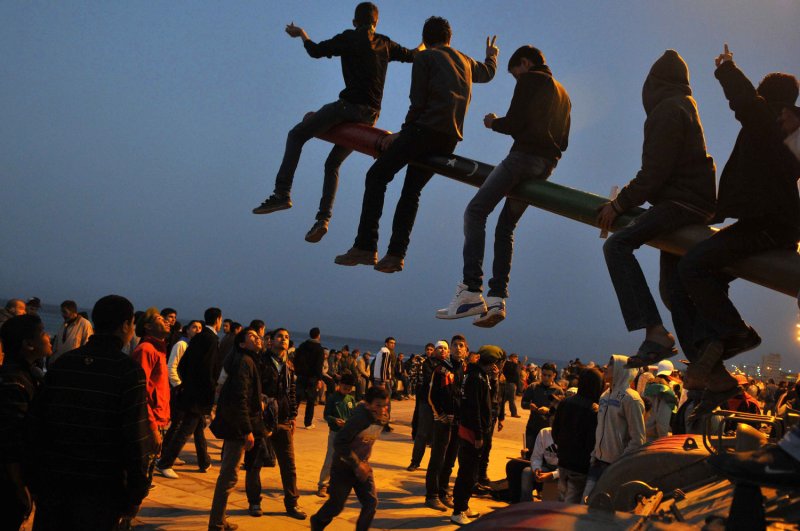Protesters celebrate on a tank as they shout slogans against Libyan leader Moammar Gadhafi near the port of Benghazi, Libya along the Mediterranean coast on March 6, 2011. Loyal and rebel forces continue to battle for control of the country. UPI/Mohamaad Hosam |
License Photo
CAIRO, April 5 (UPI) -- Large-scale sales of weapons and other military equipment to Libya have come back to haunt European powers as they seek to bring down Moammar Gadhafi, with Britain, France and Italy using the same advanced combat jets they once tried to sell to his regime.
Not for the first time, the world's arms manufacturers -- largely from the United States and Europe -- find themselves in the awkward position of having sold weapons to unsavory regimes that became international pariahs and have turned the arms on their own people.
Britain's Daily Mail newspaper reported Tuesday that the British Parliament's Committee on Arms Export Controls said in a critical report that the government sold weapons to Libya and other Middle Eastern regimes a few months before the uprisings against Arab dictatorships erupted in January.
"Both the present government and its predecessor misjudged the risk that arms approved for export to certain countries in North Africa and the Middle East might be used for internal repression," the report declared.
"We recommend the government sets out how it intends to reconcile the potential conflict of interest between increased emphasis on promoting arms exports with the staunch upholding of human rights."
Britain is a leading arms exporter. Ministers in the Labor government of Prime Minister Gordon Brown, which fell in the 2010 elections, were reported to have approved the sale of crowd-control weapons to Gadhafi's regime even as it was negotiating with it on the eventual release of former Libyan agent Abdelbaset al-Megrahi from a Scottish prison.
Megrahi was convicted in 2001 of the December 1988 bombing of a Pan Am Boeing 747 over Lockerbie, Scotland, in which 270 people were killed. He was released in August 2009 on compassionate grounds because he was diagnosed with terminal cancer. Critics of the release claim it was linked to a major oil contract with Tripoli for BP. London denies that.
The use of U.S. and European weapons by regimes in Egypt, Libya, Tunisia, Yemen and other Arab states against pro-democracy protesters in recent weeks has stirred demands for stricter control over arms sales to states with poor human rights records.
"This is a damning report that shines light on the dirty secret of Britain's arms exports to authoritarian, undemocratic and abusive regimes," said Kaye Stearman of Britain's Campaign Against the Arms Trade, a group that works to abolish international arms sales.
"This should be a wake-up call to the government."
There are no conclusive figures for the number of casualties inflicted by Arab regimes on protesters since the first uprising began in Tunisia in January. However, there have been reports of at least 1,000 killed in Libya, mainly by Gadhafi's forces, more than 350 in Egypt, and hundreds more in Yemen, Syria, Jordan, Bahrain, Algeria and Oman.
The British parliamentary report include official statistics that indicate that since 2009, Britain approved export licenses worth $3.71 billion to 61 states over a 21-month period.
Military sales to Libya totaled $98.9 million, while Saudi Arabia got British arms worth $2.74 billion, Algeria $446.7 million, the United Arab Emirates $85.2 million and Egypt $32.9 million.
The committee conceded that the current Conservative-Liberal government has been "vigorously backpedaling" to revoke 156 arms export licenses to the Middle East and North Africa since the uprising began.
But it expressed deep concern about arms sales by both governments to authoritarian regimes that are at odds with Britain's stated position of upholding human rights.
However, it is clear that for the British, as well as the U.S., European and Russian governments, that conditions concerning democracy and human rights are often found to be secondary when balanced against geopolitical considerations, such as opposition to Iran, or energy supplies.
For Western political leaders, "policies that seemed fine prior to the revolutions (in the Arab world) are now questionable," the German newsmagazine Der Spiegel observed in a report on arms sales.
"Regional paradigms are shifting and, at a time when populations are throwing off the yoke of oppression, Realpolitik is a poor guide to Western policy."
Der Spiegel noted that in late 2009 Britain's Prince Andrew visited Yemen for trade talks with President Ali Abdullah Saleh, who has ruled since 1978, and talked him into buying British defense products.
Saleh is now hanging on to power by his fingernails -- while his troops shoot protesters in the streets.















